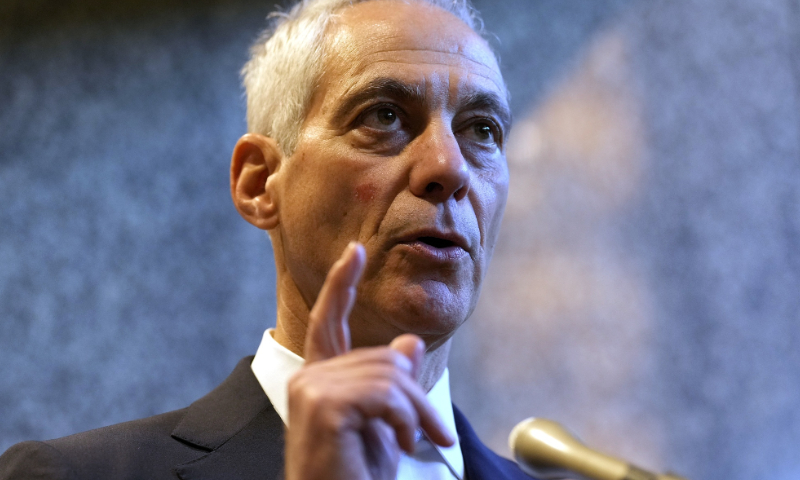This anti-China US ambassador to Japan is definitely not a positive asset to Tokyo: Global Times editorial

US Ambassador to Japan Rahm Emanuel speaks to media after meeting with Japanese Foreign Minister Yoko Kamikawa in Tokyo on November 30, 2023. Photo: VCG
While Japan is busy with relief operations after the earthquake, US Ambassador to Japan Rahm Emanuel is busy doing something else - driving a wedge between China and Japan, as always. He posted on his social media account, "On New Year's Day PRC leadership announced that they will keep ships in and around Japan's Senkaku Islands (Diaoyu Islands) for 365 consecutive days, quite the New Year's resolution." He also hyped various difficulties China is facing, trying hard to attack China.
Ironically, as the US ambassador to Japan, Emanuel's post contains completely false information. Emanuel's words were inconsistent with existing relevant reports. A spokesman for Japanese Ministry of Foreign Affairs' China and Mongolia Division told the media that "it is not confirmed if the Chinese government officially announced such a plan." It can be seen that his post is a lie based on hearsay.
Japanese and American netizens also do not buy Emanuel's remarks, with one netizen commenting that the US ambassador to Japan is too obsessed with matters beyond his jurisdiction, mistakenly thinking that he is also the ambassador to China. It is truly bizarre for a country's ambassador to openly sell rumors and remain unfazed after being exposed.
Moreover, even if what Emanuel said is "factual," due to China's indisputable sovereignty over the Diaoyu Islands, dispatching ships to patrol and enforce laws in the waters around the Diaoyu Islands is a legitimate and unquestionable right of China. It is not within the purview of the US ambassador to make unwarranted comments. In addition, Emanuel's purpose is to provoke discord between China and Japan, disrupting the improvement process of China-Japan relations.
In fact, this is not the first time that Emanuel has provoked China. Since he assumed the position of the US ambassador to Japan since 2022, his focus has consistently been on China. Just before taking office, he claimed in an interview with Japan's NHK television that China is not a "good neighbor" to Japan. In August of 2022, in an interview with Reuters, he recklessly asserted that if China "doesn't like what you say politically, they put the muscle on you economically." Subsequently, Emanuel frequently made baseless accusations against China on various China-related issues, jeopardizing China-Japan relations. In August of last year, after the Japanese government forcibly dumped Fukushima nuclear wastewater into the sea, Emanuel repeatedly made unfounded comments on China's stance, drawing strong criticism. Due to his penchant for provocative attacks against China, he has been jokingly referred to as the "anti-China ambassador" of the US in Japan. Washington seems to have taken notice of his excessive behavior. In September of last year, the National Broadcasting Company (NBC) reported that White House told Emanuel to stop "taunting" China on social media, as his comments "risk undermining the administration's efforts to mend deeply strained relations with China," including with a possible meeting between the Chinese and US heads of state.
Emanuel previously served as a senior advisor to former US president Bill Clinton, White House chief of staff under Barack Obama, and mayor of Chicago, among other important positions. However, he has a bad reputation in the US political circle and has offended many people due to his hot temper and outspokenness. After the Biden administration took office, due to his past controversies and scandals, his appointment faced opposition in the Senate hearing. Finally, the position of ambassador to Japan, as a "plum position" for rewarding achievements, was assigned to this "heavyweight" politician. However, after assuming the position of ambassador to Japan, he did not stay in his lane, but instead jumped around on Japanese media and social platforms. On the one hand, he vigorously boasted about his work in Japan, including claiming to have helped Japan "transform its strategic thinking," increase defense spending, and develop offensive military capabilities. He also actively promoted Japan's procurement of US weapons, among other things. In this process, Emanuel's "magic weapon" is to exaggerate the "China threat." As he testified before senators, he believes that a core part of the envoy job is about countering China, so increasing Japan's defense budget is indispensable for the US-Japan alliance.
Emanuel's various "showing off" behaviors in Japan have exposed the arrogant and conceited attitude of some American politicians toward other countries. His negative remarks and actions toward China, on the surface, seem to be "favoring Japan," but in reality, they are acts that go beyond his authority. As the US ambassador to Japan, he meddles in Japan's relations with other countries, constantly stirring up trouble and sowing discord. This behavior shows disrespect toward the Japanese government and people, and only further confirms the superior and condescending attitude that some Americans hold toward Japan. Such an "anti-China US ambassador to Japan" is definitely not a positive asset to Tokyo.

